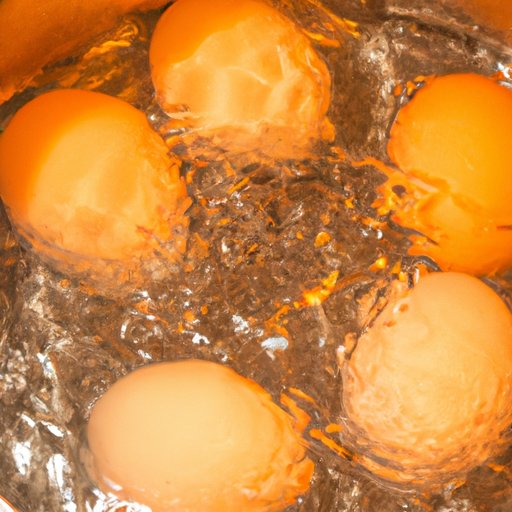
I. Introduction
Boiling eggs may seem like a simple task, but as anyone who has ended up with rubbery or overcooked eggs knows, it’s easier said than done. Over-boiling an egg can impact the taste, texture, and nutritional value of this commonly eaten food. In this article, we will explore the science behind boiling eggs, provide a step-by-step guide on how to boil eggs perfectly every time, discuss common mistakes to avoid, and even debunk a myth or two to ensure you have all the knowledge you need to boil eggs just right.
II. The Science of Boiling Eggs: How Overcooking Affects Taste and Texture
Eggs consist of water, protein, and fats. When an egg is boiled, the heat causes the proteins in the egg to denature and coagulate, causing the egg to solidify. Overcooking an egg can cause the proteins to become tough, resulting in a rubbery texture and unpleasant taste. Additionally, overcooked eggs may develop a greenish-grey tint around the yolk due to the formation of iron sulfide, resulting in an unappetizing appearance.
To determine if an egg is overcooked, pay attention to the color of the yolk and the texture of the egg white. An overcooked egg will have a greenish-gray yolk and rubbery egg white that comes apart in chunks.
III. A Step-by-Step Guide to Boiling Eggs Perfectly Every Time
Boiling eggs perfectly every time can seem like a daunting task, but with the right technique, it’s easy. First, place the eggs in a saucepan and cover with cold water. Bring the water to a boil, then remove the pan from the heat and let the eggs sit in the hot water for the desired amount of time. For soft-boiled eggs, cook for 4-6 minutes, and for hard-boiled eggs, cook for 8-12 minutes. Once done, immediately transfer the eggs to an ice bath to prevent further cooking and facilitate easy peeling.
It’s important to note that the type of egg you are cooking can impact the cooking time. For example, fresh eggs will require slightly longer cooking times than older eggs. Additionally, altitude and stove strength can impact cooking times, so it’s important to adjust accordingly.
Once boiled, store the eggs in the fridge for up to one week. It’s important to store them in an airtight container to prevent them from absorbing other aromas in the fridge.
IV. Boiling Eggs 101: Common Mistakes and How to Avoid Them
Common mistakes when boiling eggs include not starting with cold water, not using the proper size pot, and overcooking the eggs. To avoid these mistakes, make sure to start with cold water and a proper-sized pot and use a timer to ensure you don’t overcook your eggs. When peeling eggs, it can be frustrating when the shell sticks. To solve this issue, gently crack the egg on a hard surface and peel under running water.
V. The Benefits of Boiling Eggs Just Right: Nutritional Value and Digestibility
Eggs pack a nutritional punch, with high levels of protein and vitamins. However, overcooking can impact the nutritional value of the eggs. Overcooking can cause the yolk to become dry and chalky and the white to become rubbery, impacting the digestibility of the egg. To ensure you receive the maximum nutritional value and digestibility from your boiled eggs, make sure to cook them just right.
VI. Debunking the Myth: Can Over-Boiling An Egg Cause It To Explode?
A commonly held myth is that an over-boiled egg can explode, causing potential harm in the kitchen. While this is technically possible, it’s extremely unlikely. If the egg is exposed to high heat for an extended amount of time, pressure can build up within the egg, potentially causing it to crack or explode. However, even if this does occur, the likelihood of harm is low.
VII. Artistic Approaches to Decorating Perfectly Boiled Eggs for Special Occasions
Boiling eggs doesn’t need to be a mundane task. The perfectly boiled egg can be used as a canvas for artistic displays. From incorporating natural dyes to using different shapes and designs, creative individuals can take their boiled eggs to the next level. Consider making a wreath out of boiled eggs for Easter or sprinkling with sesame seeds for added texture and flavor.
VIII. Conclusion
Boiling eggs can seem like a simple task, but it’s essential to get it just right. Over-boiling an egg can impact the taste, texture, and nutritional value of eggs, so it’s important to follow proper technique. With the step-by-step guide, common mistakes to avoid, and creative ideas for decorating boiled eggs, you’ll be able to boil eggs perfectly every time and impress guests with your artistic display.




